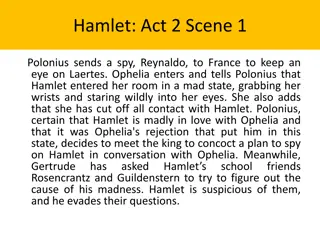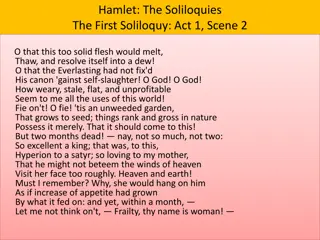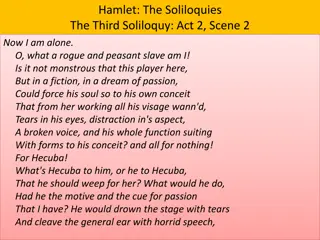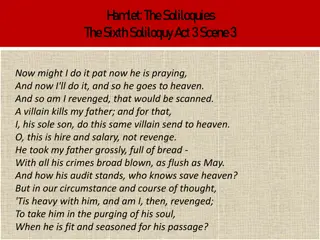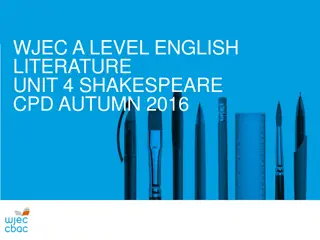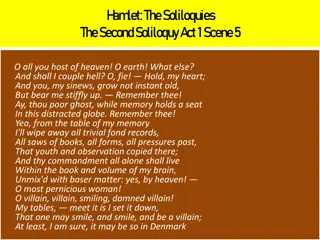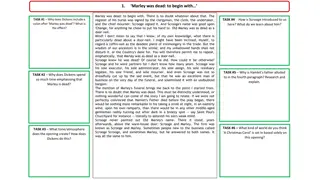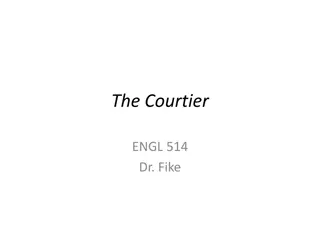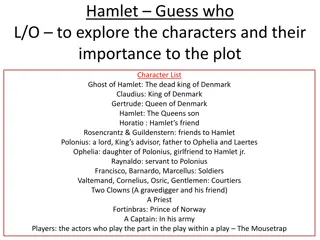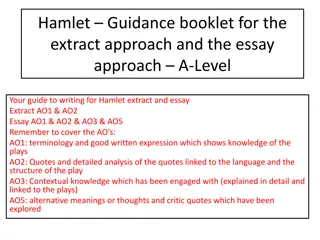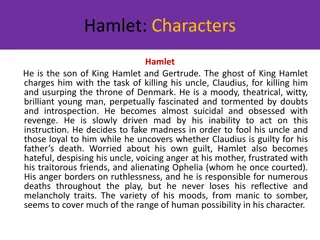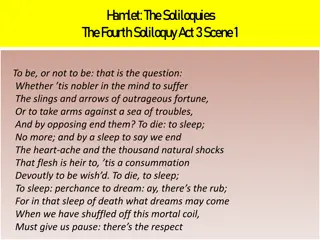Insights from Critics on Hamlet's Character and Themes
Various critics provide intriguing perspectives on Hamlet's character and the themes within the play. Swinburne emphasizes Hamlet's inner nature as a conflux of forces, while Samuel Johnson views Hamlet more as an instrument than an agent. Von Goethe discusses the challenges faced by Hamlet in fulfilling duties considered holy. Coleridge highlights the imbalance in Hamlet's thoughts and actions, and Wilson Knight delves into the complex characters of Hamlet and Claudius, shedding light on their roles in the state of Denmark.
Download Presentation

Please find below an Image/Link to download the presentation.
The content on the website is provided AS IS for your information and personal use only. It may not be sold, licensed, or shared on other websites without obtaining consent from the author. Download presentation by click this link. If you encounter any issues during the download, it is possible that the publisher has removed the file from their server.
E N D
Presentation Transcript
HAMLET Critics and key vocab http://people.brandeis.edu/~teuber/ earlycrit.html
Swinburne The single characteristic of Hamlet s innermost nature is by no means irresolution or hesitation or any form of weakness, but rather the strong conflux of contending forces Paraphrased: A characteristic of Hamlet s innermost nature is not irresolution or hesitation, but a desire to prove an argument right and the struggle to overcome dangers.
Samuel Johnson Hamlet is, through the whole play, rather an instrument than an agent. he makes no attempt to punish Claudius, and his death is at last effected by an incident which Hamlet has no part in producing
Von Goethe Impossibilities have been required of Hamlet; not in themselves impossibilities, but such for him. All duties seem Holy for Hamlet
Bradley Hamlet is unable to carry out the sacred duty, imposed by divine authority, of punishing an evil man by death
Coleridge Paraphrase: Shakespeare seems to have wished to exemplify the moral necessity of balance between our senses and our minds. In Hamlet, this balance seems disturbed; his thoughts and imagination are far more vivid than his actual perceptions. Hamlet is obliged to act on the spur of the moment
Wilson Knight Claudius, as he appears in the play, is not a criminal. He is strange as it may seem a good and gentle king, enmeshed by the chain of causality linking him with his crime. And this chain he might, perhaps, have broken except for Hamlet, and all would have been well. Hamlet is an element of evil in the state of Denmark
Wilson Knight Claudius can hardly be blamed for his later actions. They are forced on him. As King, he could scarcely be expected to do otherwise. Hamlet is a danger to the state, even apart from his knowledge of Claudius guilt. He is inhuman ( ) he is feared by those around him. They are always trying in vain to find out what is wrong with him. They cannot understand him. He is a creature of another world. As King of Denmark he would have been a thousand times more dangerous than Claudius.
Wilson Knight Hamlet is a figure of nihilism (The rejection of all religious and moral principles, often in the belief that life is meaningless) and death. He is in fact the poison in the veins of the community. The question of relative morality of Hamlet and Claudius reflects the ultimate problem of the play
Alexander The play does not offer any conclusions about what is the right repsonse to the questions it poses about human aggression, not because it is confused but because Hamlet is aware that more than one single set of answers exists. The proof of the King s guilt does not solve Hamlet s problem. The question remains, how does one deal with such a man, without becoming like him?
Belsey Revenge is not justice. It is rather an act of injustice on behalf of justice Revenge is always in excess of justice Claudius is still in possession of the crown and Gertrude and is planning the death of Hamlet ( ) in these circumstances revenge is a political as well as a moral issue Revenge exists on a margin between justice and crime
Alexander The desire for vengeance is seen as part of a continuing pattern of human conduct. The audience are entertained because they are being asked to see, feel and understand a little more about the hidden springs of action which are supposed to drive the characters.
Alexander The feeling of failure and frustration, which Hamlet himself recognizes, is created by this rapid alternation between the language of blood revenge and the language of conscience. The other characters in the play do not hesitate to act because they are sure of their own values and beliefs. Fortinbras and Laertes act because they believe that certain actions are right or honourable.
Marilyn French Rosencrantz and Guildenstern sacrifice the bond of human friendship to a social propriety
Rebecca Smith Although he clearly loves her- Claudius shares the Hamlets conception of Gertrude as an object. She is possessed as one of the effects of his actions. Gertrude uses her dying words to warn Hamlet of the poison, but doesn t accuse Claudius. Gertrude has not moved in the play toward independence; only her divided loyalties and her unhappiness intensify.
Rebecca Smith Polonius seems to love his children; he seems to have the welfare of the kingdom in mind. His means of action, however, are totally corrupt. Female virtue is identical with chastity; thus Polonius ( ) trained his daughter to be obedient and chaste and is able to use her a a piece of bait for spying.
Showalter Ophelia is deprived of thought, sexuality and language. She represents the strong emotions that the Elizabethans as well as the Freudians thought womanish and unmanly. Hamlet s disguist at the feminine passivity in himself is translated into violent revulsion against women and into his brutal behaviour towards Ophelia
Brucher Revengers create their own civil justice, often in ways that imitate or even mock divine justice and that compromise their own moral impulses. The problem is that while a diabolically ingenious killing may offend our moral responsibilities, it may also appeal to our fantasies about power, control and poetic justice in a corrupt world
Unknown There is the simple, inescapable fact that the attempt to rid Denmark of its villain-king has left the country in a worse state than it was at the outset. Guildenstern and Rosencrantz are a pair of faceless automatons (imitating human beings) and serve as an element of comedy in the tragedy. When the King thanks Rosencrantz and gentle Guildenstern the Queen thanks Guildenstern and gentle Rosencrantz . They are so alike that they are almost indistinguishable.
Key vocabulary to use Social disorder is reflected in the play Seneca is the creator of the genre Antithesis is the opposite of something Ubiquitous refers to an idea or a feeling which is present everywhere, e.g. corruption Jacobean establishes when the play was set Patriarchal refers to a male dominated society
Key vocabulary to use Soliloquy/soliloquies refer to Hamlet s monologues which are directed at the audience Middleton uses asides for a similar effect Retribution means the same as revenge Malcontent refers to a person disillusioned with the society Hubris describes excessive pride and over confidence
Key vocabulary to use Hamartia is another term for fatal flaw Anagnorisis refers to the moment in the play when a character makes a critical discovery Stichomythia is when dialogue is used as alternating lines (as seen in the closet scene) Plethora refers to an excess of something Inexorable describes something which is impossible to stop. Circumlocutious is a word for unnecessarily wordy speech Louche can be used to describe something or someone of of questionable taste or morality Quixotic refers to something exceedingly idealistic Convoluted means extremely complex To ruminate is to think of something deeply




